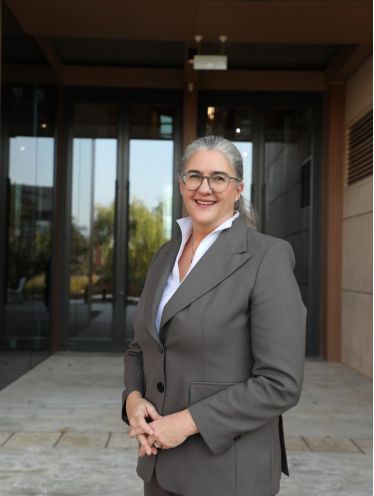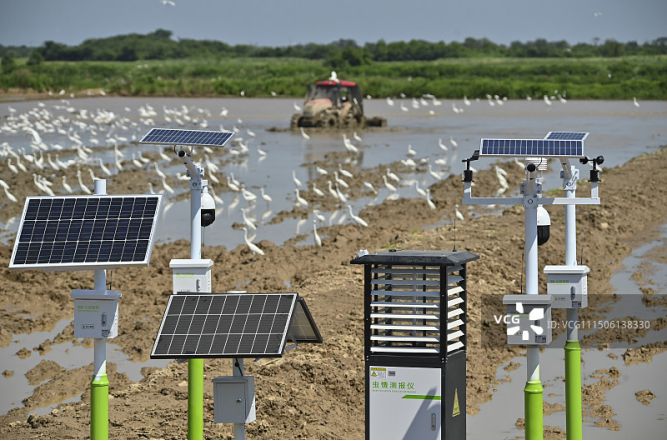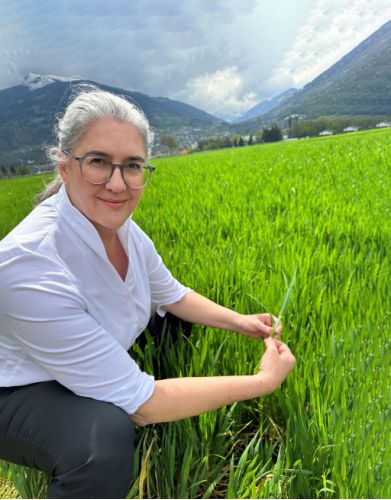Alexandra Brand, known by her Chinese name Bai Shan, was born in Germany. She pursued her studies in Chemistry at the Technical University of Darmstadt in 1990, earning her PhD in 1998. Her career began at BASF, where she held various management roles before joining Syngenta in 2015. Since 2023, she serves as the Executive Vice President of Sustainability and Corporate Affairs at Syngenta Group.

In October 2024, Alexandra Brand was interviewed by Global People Magazine in Beijing. (Photographed by correspondent, Hou Xinying)
A quick online search might paint Alexandra Brand as a "serious and reserved" figure—a German scientist and senior executive with an impressive resume. True to form, she exuded a commanding presence the moment she sat before the camera for our interview.
However, as soon as she spoke, the impression shifted:"I have a Chinese name—Bai Shan," she said with a smile. She spoke with a rhythmic, well-modulated tone, full of expression.
The atmosphere instantly lightened. "A suit and white shirt reflect the dress code of an executive, black-framed glasses are the hallmark of a scientist, and pearl earrings add a touch of femininity. I really like your outfit," remarked the Global People reporter before the interview began.
She responded with hearty laughter, "Next time I come to China, I’ll make sure to wear something more colorful!"
"Innovating with Chinese Farmers"
Brand visited Beijing to attend the 2024 World Agrifood Innovation Conference, held in Pinggu District this October.
Her enthusiasm for her first conference was palpable, "After touring the exhibitions and attending the forums, I was deeply impressed by the widespread acceptance of sustainable development among China's agri-food enterprises and across society," she shared. "I saw many small and medium Chinese agri-food enterprises actively exploring new technologies such as drones, big data, and artificial intelligence. It’s also inspiring to see women playing increasingly vital roles in agriculture—intelligent, courageous, and resilient women who are shaping the future of our industry. We look forward to collaborating with more Chinese farmers and businesses."
Dedicated to agricultural science and technology, Syngenta has a history spanning 250 years. Headquartered in Switzerland, the company has offices worldwide. In 2017, Syngenta was acquired by ChemChina and later became an overseas subsidiary of Sinochem Holding, further strengthening its ties with Chinese market and farmers.
"Our (ag-input) products have been very well-received in the Chinese market," Brand said. "Two years ago, we introduced an proprietary active ingredient to China. It protects crops from root pests while enhances soil health and its microbial ecosystem. Today, it’s one of our top-selling products in China, earning praise from agronomists who tested it in the fields."
Syngenta’s innovations extend to seeds as well. "We identified a a salt-tolerant gene in sorghum and incorporated it into other crop seeds. This breakthrough can help Chinese farmers make better use of vast saline-alkali lands in China," she explained.
Brand also highlighted Syngenta’s expertise in digital agriculture. "We operate over 600 farmer service centers, also called MAP centers, and build our MAP digital agriculture platforms in China, directly connecting and serving more than 300,000 Chinese growers. The MAP digital platforms provide data analytics and services such as weather forecast and soil evolution, alongside agronomic advice. We aim to create an integrated online-and-offline system to deliver more data-driven farming services and smart agriculture solutions."
She noted that while agricultural technology used to evoke images of large machinery, it has evolved into much more. "We look forward to innovating with Chinese farmers and sharping future agriculture together," she said.

In July 2024, modern IoT monitoring equipment at the Datian Agritech’s farm in Jiangxi.
"Agriculture Is Cool "
For Brand, "curiosity" is a defining trait.
Born in a city in central Germany, Brand is in her fifties and comes from a middle-class family. She and her brother were the first in their family to earn university degrees.
Fascinated by chemistry, Brand has been captivated by molecules since childhood. "I believed that understanding how molecules work would unlock the rules governing the world," she recalled. Between 1990 and 1998, she pursued her studies from undergraduate to doctoral levels at Technology University of Darmstadt. "I completed my PhD in just two and a half years— a record then at my university," she said.
"My brain is wired for chemistry," she continued. "Some people are great singers, but I’m tone-deaf; others are good with their hands, but I can barely use a screwdriver. Fortunately, my interest and talent align perfectly with chemistry."
After graduation, she joined BASF, initially working in research for four years, preparing, synthesizing and assembling new molecules. However, she became increasingly curious about how her research was being commercialized and how it benefited customers. This curiosity led her to transition into the business side of the company, where she led a sales team.
Her first major assignment was to manage sales at the regional office in India. It seems to be a huge challenge. "I had no business experience and had never been to India. But I thought, why not? What’s the worst that could happen?" She successfully completed her mission in Mumbai, gaining valuable cross-cultural experience along the way.
Brand joined Syngenta in 2015, initially overseeing its crop protection and seed businesses across Europe, Africa, and the Middle East. From 2018 to 2020, she served as Chief Sustainability Officer, leading the newly established sustainability team and advancing the company’s sustainability initiatives. In November 2023, she assumed her current role as Executive Vice President of Sustainability and Corporate Affairs.
"Whether at BASF or Syngenta, my work has always revolved around agriculture," she said. "Agriculture is a fascinating industry. It’s about life, the environment, and solving challenges. Modern agriculture is a marvel. A few generations ago, exotic fruits and vegetables were considered luxuries. Today, they’re accessible worldwide. The future of agriculture lies in producing more food on limited land while reducing carbon emissions—a mission that inspires me."
She added, "My role requires frequent travel, allowing me to witness diverse lifestyles and the changes of cities and countries around the world."
"Smart Multinational Companies Won’t Miss Opportunities in China"
Global People: What are your impressions of rural China?
Alexandra Brand: I’ve visited many farms in China, and two experiences stand out. One was at a small family farm of about one hectare, run by a husband and wife. Their curiosity and eagerness to learn new techniques left a strong impression on me.
The other was a visit to a large, modernized farm equipped with advanced machinery and agricultural knowledge. Such large-scale farms in China are now on par with their counterparts in Western countries like the U.S.
China’s diverse agricultural operations reflect the varied individuals involved. Farmers include those working tirelessly for their families and entrepreneurial professionals managing large-scale operations.
I love China’s countryside for its warmth and vibrancy. While I don’t speak Chinese and can’t recall the names of the villages I’ve visited, I remember the scenery vividly. Green and golden fields often lead to cozy farmhouse restaurants or charming tea houses, where I’ve always been warmly welcomed whenever I need a rest.

Alexandra Brand visits farmlands.
Global People: How do you view the development and transformation of Chinese agriculture?
Alexandra Brand: China’s vast territory results in a highly diverse agricultural system.
The southern regions enjoy tropical climates, while the north experiences temperate weather, leading to varied crops between the two areas. In addition, China’s livestock sector is thriving, with strong demand for pork, fish, poultry, and dairy products. These needs are reshaping the overall agricultural landscape.
In recent years, the Chinese government has made significant investments in agriculture. Currently, the sector is undergoing rapid modernization. I’ve personally witnessed the "Chinese speed" in farmlands. Moving forward, greater scalability, intelligence, and digitalization will undoubtedly shape the future of Chinese agriculture.
However, this doesn’t mean that traditional practices will disappear. As an agricultural powerhouse with a rich history, China retains a deep-rooted cultural connection to its land. Even today, many people working in cities return to their hometowns during the Lunar New Year to reunite with family in their villages.
I believe high-tech agriculture and traditional farming are not in conflict. On the contrary, advanced technologies are highly appealing to younger generations. I am confident that China’s modernized farms will attract more young people to return to rural areas.
Global People: Beyond the countryside, how do you perceive other China’s transformation?
Alexandra Brand: The achievements China has made in the past 30 years are nothing short of extraordinary. My first visit to China was in 2003 when I traveled to Shanghai. Back then, the city looked entirely different compared to today. Modern Shanghai showcases updated hotel furnishings and an extensive network of interconnected roads and highways.
In contrast, my hometown in central Germany still has many old buildings, and infrastructure investments are clearly lacking. China’s urban modernization is stunning and offers valuable insights for other countries.
Global People: As an executive in a multinational corporation, how do you view the functioning of China’s economic system?
Alexandra Brand: Having visited China multiple times, I have gained a deep understanding of its market and interacted with some economic sectors. I am particularly impressed by the seamless communication across different stakeholders in China. Enterprises, government bodies, and academia cooperate with trust and mutual understanding, working together to drive economic development.
In many countries, amending outdated economic policies can take a long time. Yet, in China—a vast nation—timely changes are often implemented more efficiently.
This flexibility underpins China’s rapid economic growth and will continue to support its progress as for the current global economic landscape.
Over the past few decades, China has been a key driver of global growth. While its annual GDP growth has slowed from double digits to around 5%, the sheer scale of its economy means its contributions to global economic growth remain substantial.
China’s market size and complexity not only offer growth opportunities but also foster innovation. For example, in agriculture, China’s modernization is a unique challenge due to its need to simultaneously enhance crop yields, protect the environment, and address regional variations in climate and geography. This "complex exam"calls for innovative solutions.
The foreseeable sustained growth of China’s economy continues to attract global businesses. Smart multinational companies will not miss the opportunity to engage with China.
(Intern Zhang Linjia contributed to this story.)
 Editor:Mao Yufei
Editor:Mao Yufei